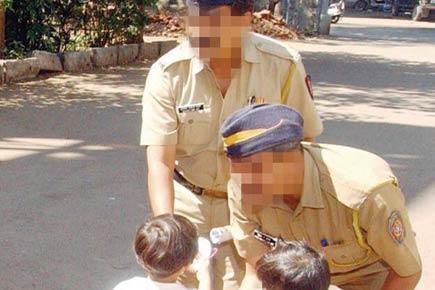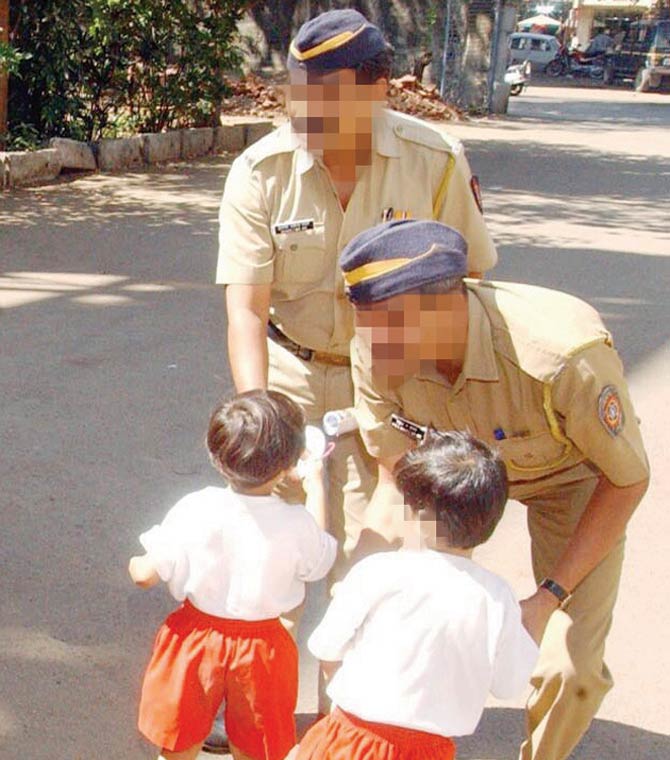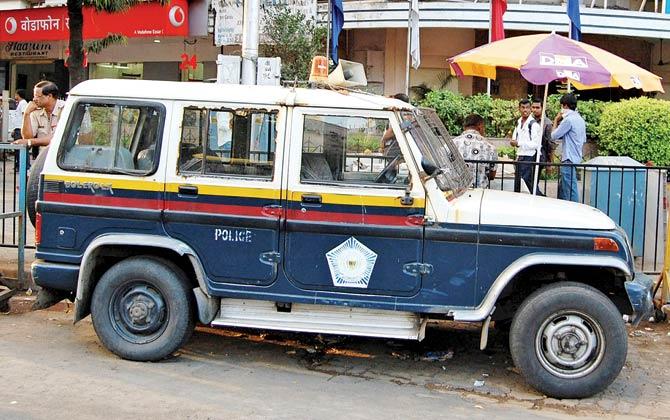Home department circular suggests holding durbars to hear grievances of constables used by IPS officers to run errands like shopping for vegetables and escorting wives to the parlour

When a police constable dons his khaki uniform for the first time, it is undoubtedly with dreams of putting criminals behind bars, and not buying vegetables for the boss’s wife or driving their children to school.

Some cops are made to work as nannies, picking up and dropping off kids from school. Pic for representation
ADVERTISEMENT
But this is exactly what happens to hundreds of constables who are reduced to little more than bonded labour for the officers, as a circular from the Home department highlights. But these constables – who have long complained about the misuse of their services to the Mantralaya and their respective police commissionerates — now have reason to rejoice.

Constables complained that officers forced them to perform menial tasks in uniform, often using official vehicles. File pic for representation
For the first time, the Home department issued a notice on October 29 (mid-day has a copy) asking that all commissionerate offices across the state hold an open durbar to hear out their complaints. In keeping with British-era traditions, several constables are posted as orderlies or batmen at the offices and homes of IPS officers.
Officially, they are meant to serve as telephone operators or office assistants, who will answer or make calls for their boss, schedule appointments and maintain records. However, many of them are unabashedly used as servants by the officers and their families, and made to carry out household chores.
‘Ashamed’
“We are often made to do these household jobs in government vehicles. We feel ashamed to do these kinds of jobs wearing our uniforms, but have no choice,” said one constable.
The Home department’s Marathi circular refers to complaints from constables, alleging that the officers and their wives command them to buy vegetables from the market, get flour from the flour mill, escort the officer’s wife to beauty parlours and movies and ferry the children to school and tuitions.
Exploitation
But the nightmare only gets worse if they try to object to such chores. Officers hold the power to stall their increments or promotions, or cancel their leave, and this threat is constantly held over the constables’ heads.
In fact, protesting against the injustice might even bring their career to a standstill, as officers also have the power to hold them back from appearing for the PSI examination that will allow them to progress to the rank of a police sub-inspector.
A clerk attached to one IPS officer in south Mumbai narrates a telling incident, “One day a constable attached to an IPS officer left without informing the officer’s wife. She informed her husband, who then called the constable back.
The constable had already reached Thane station and was heading home. When the constable reported back to the officer’s home in south Mumbai, the officer told him that there was no work; he had only called the constable back to teach him a lesson.”
The Home department’s circular highlights all of this, and has called for an end to the abuse of orderlies. This is part of the Modi government’s decision to ban the British-era legacy of using orderlies to run personal errands for officers and their family members.
This follows in the footsteps of the Union Home ministry, which had last year issued a circular to all the paramilitary forces, asking that personnel be used only for official work, and then too, minimally. A senior police officer told this paper, “Officers ranked DCP and above are given constables, but only two are permitted for each officer.
But the number increases for higher level officers such as the joint commissioner of police to commissioner and director general of police. They are given three to four constables, but some top cops even keep five constables, which is not permissible.”
While scrutinising the complaints, the Home department has learnt that such harassment is rampant across the state, but maximum complaints have come against IPS officers posted in Nashik. But constables hope that with the instatement of a durbar, officers will think twice before exploiting them.
Platform for constables
“Though some constables will still be reluctant to report the exploitation, this order will deter officers from misusing government servants. Earlier, there was no one to hear us, but with this platform, many will stand up and come forward to claim their dignity,” said a constable.
Former Mumbai police commissioner M N Singh told mid-day, “I welcome the move. Actually, this practice has been going on since the British era and not only in the police, but other departments too. In the old days, constables were used as house servants, for household work such as cooking.
However, it is high time we stop using them as labourers. Earlier, these constables were illiterate, but now, they are all graduates and post-graduates. They have dignity and self-respect, and join the department for a respectable job.”
Singh pointed out how former commissioners had made an attempt to connect with constables and other junior policemen. “Times have changed; constables can do a lot for the department. When I was commissioner, I would meet with my staff every week.
Anyone could come forward with their problems and speak out. Records were maintained and follow-up was done. We even used to have community meals, called Bada Khana, wherein constables would be served food by senior cops. Rakesh Maria used to play basketball with constables,” he added.
 Subscribe today by clicking the link and stay updated with the latest news!" Click here!
Subscribe today by clicking the link and stay updated with the latest news!" Click here!







